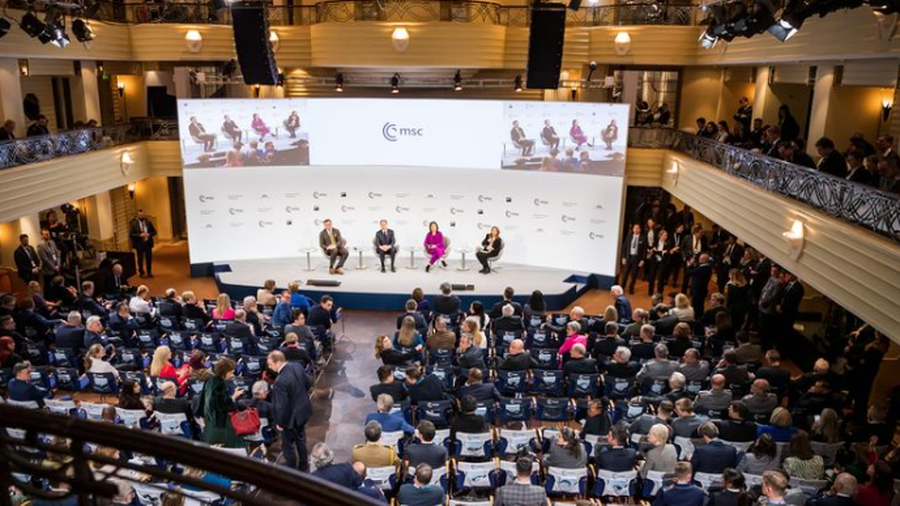
Traditionally close ties between the US and Europe have characterized the Munich Security Conference for decades.
Despite some differences: the basis was stable. The cooperation was good and the appreciation mutual. But since US President Donald Trump took office, this certainty is crumbling. And for this reason the meeting known internationally as the Munich Security Conference (MSC), which starts on Friday (February 16, 2025), is indicative of the state of transatlantic relations.
Will the luster of relations between the US and its allies fade?
One thing is certain: Already in the first weeks of Trump's second term as US President, a different wind is blowing from Washington: America First is Trump's unconditional motto, even if his policies come at the expense of allies. These tensions are likely to characterize some of the debates at Munich's traditional conference hotel "Bayerischer Hof", where politicians, military and experts will meet from February 14 to 16.
60 heads of state and government are expected at the MSC, which is considered the world's most important forum for security policy. From the new US administration, in addition to Vice President JD Vance, Secretary of State Marco Rubio has also confirmed his participation, but not the new Secretary of Defense, Pete Hegseth. In addition, the conference chairman, Christoph Heusgen, announced that one of the largest delegations of the US Senate and Congress to ever come to the MSC is expected. Among the guests is also the new Secretary General of NATO, Mark Rutte.
Forum for open exchange of opinions
The Security Conference is an informal meeting, where no decisions are made. That is why there is open discussion and conflicts are not swept under the rug. Donald Trump is already taking a different, harsher tone in transatlantic relations. "We have been ripped off by European countries both in trade and in NATO," the "Munich Security Report", published on the occasion of the conference, quotes a statement made by Trump during the election campaign. And further, addressing the Europeans, it says: "If you don't pay, we won't protect you."
Trump has taken issue with what he sees as insufficient military investment by some of NATO's European partners. He has also repeatedly criticized Germany for this. Washington has so far paid the lion's share of NATO costs and has provided Europe with reliable military protection. It is no longer available "for free": Trump is demanding that allies spend five percent of their gross domestic product on defense. Germany is struggling to meet the two percent target, which is currently considered the minimum standard in NATO.
A world power with "scarce resources"
That Republican Trump is capable of rigorously withdrawing American funds from international organizations has already been proven. According to the "Munich Security Report", Trump's camp justifies this with the argument that even the world power the US has only limited resources and must use them for the good of its country. "Indeed, the notion of 'lack of resources' has become a central premise of Republican foreign policy thinking," the report says.
The outlines of a peace plan for Ukraine?
This could have a negative impact on aid to Ukraine, in which the US has so far played a leading role. However, Ukrainian President Volodymyr Zelensky and Trump's representative for Ukraine, Keith Kellogg, will have a lot to discuss. Both are expected in Munich.
On the eve of the conference, rumors circulated that Kellogg might present the Trump administration's plan to end the war in Ukraine at the Security Conference. When asked about this, the conference leader, Heusgen, responded cautiously: "We hope that Munich will be used for this and we also have the right signs to achieve progress towards peace in Ukraine."
Heusgen expressed hope that a peace plan could take shape in Munich. The diplomat stressed that Ukraine's territorial integrity and sovereignty must be preserved. Heusgen previously served as Chancellor Angela Merkel's foreign policy adviser and Germany's ambassador to the United Nations in New York.
However, representatives of the Russian government are not invited to the MSC. The basis for the invitation is "readiness for dialogue," Heusgen stressed, "and as long as President Putin does not recognize the Zelensky government in Kiev, I see no basis for such a dialogue." Representatives of the Russian opposition and non-governmental organizations are welcome in Munich.
Trump's claim to Greenland
Concern and consternation in Europe have been caused by Trump's threats to annex areas by force if necessary, including Greenland, which belongs to Denmark. US Vice President JD Vance supports Trump's expansionist plans. If he confirms this in Munich, he is likely to face strong opposition, especially from representatives of the EU and European countries.
They responded to Trump's threat by warning that the US must adhere to international law. "The inviolability of borders is a fundamental principle of international law. The principle must apply to everyone," said Chancellor Olaf Scholz (SPD). Conference leader Heusgen had not in vain stressed the importance of international law several times before the meeting. "In my opinion, there is no better alternative than the order reflected in the United Nations Charter."
One week before the parliamentary elections
German domestic politics will play a special role at the conference this year: The meeting is taking place just a week before the snap parliamentary elections on February 23 - at the end of the election campaign. Several candidates for chancellor have confirmed their participation, including CDU chairman and chancellor candidate Friedrich Merz, who polls predict will win the election.
Their presentations will probably also include how much money Germany will invest in the army (Bundeswehr) in the future and where the costs will come from, given the limited budget. The question is not whether, but how Germany and Europe can do more for their security. Now that Donald Trump has entered the White House, this issue is likely to be discussed at the Munich Security Conference with more urgency than ever before. (A2 Televizion)











